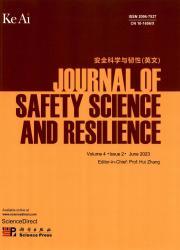A comprehensive review of bibliometric and methodological approaches in flood mitigation studies: Current trends and future directions
IF 3.4
Q1 PUBLIC, ENVIRONMENTAL & OCCUPATIONAL HEALTH
引用次数: 0
Abstract
Climate change has become a pressing concern, with an alarming increase in flooding events posing significant risks to residential areas worldwide. As land and infrastructure development rapidly evolve, it is crucial to systematically analyze the bibliometric patterns and methodological trends in flood mitigation research, with a specific focus on residential building flood mitigation. This study presents a comprehensive comparative analysis of the bibliometric patterns and methodological trends in flood mitigation research over the past two decades, identifies prevailing gaps, and proposes future research directions to enhance the effectiveness of flood mitigation strategies. Using data from the Scopus database, 441 publications were objectively selected and subjected to metadata analysis. The study identifies top authors, contributing institutions, nations, and the distribution of contributions across different fields and methodologies. The findings emphasize the need for an integrated and interdisciplinary approach to flood reduction research, considering the complex interplay of social, ecological, and physical dimensions in flood risk management. The study reveals the predominance of modeling and simulation approaches, geographic information systems (GIS) remote sensing approaches, and statistical and data-driven approaches as the most widely employed methodologies. Furthermore, it highlights the growing diversity of approaches, with increasing interest in machine learning algorithms and combined methods. Also, this study provides valuable recommendations for future research, emphasizing the importance of developing effective flood-mitigating strategies to enhance community resilience. It advocates for a multidisciplinary and integrated approach, leveraging geospatial technologies, machine learning algorithms, and collaborative methodologies to advance flood mitigation research and practice. Future research should consider exploring additional databases, including Web of Science, EBSCO, IEEE, and Google Scholar, to conduct a more comprehensive review of the available literature. There is need for future studies to conduct in-depth comparative analyses of flood mitigation methodologies, particularly in the context of residential buildings.
洪水缓解研究中文献计量学和方法学方法的全面回顾:当前趋势和未来方向
气候变化已经成为一个紧迫的问题,洪水事件的惊人增加给世界各地的居民区带来了重大风险。随着土地和基础设施的快速发展,系统分析防洪研究的文献计量模式和方法趋势至关重要,特别是对住宅建筑的防洪研究。本文对近二十年来洪水减灾研究的文献计量模式和方法趋势进行了全面的比较分析,指出了主要的差距,并提出了未来的研究方向,以提高洪水减灾战略的有效性。利用Scopus数据库中的数据,客观选择441篇出版物进行元数据分析。该研究确定了顶级作者、有贡献的机构、国家,以及不同领域和方法的贡献分布。研究结果强调,考虑到洪水风险管理中社会、生态和物理维度的复杂相互作用,需要一种综合和跨学科的方法来减少洪水的研究。研究表明,建模和模拟方法、地理信息系统(GIS)遥感方法、统计和数据驱动方法是最广泛使用的方法。此外,它还强调了方法的多样性,对机器学习算法和组合方法的兴趣越来越大。同时,本研究为未来的研究提供了有价值的建议,强调了制定有效的防洪策略以增强社区抵御能力的重要性。它倡导采用多学科综合方法,利用地理空间技术、机器学习算法和协作方法来推进防洪研究和实践。未来的研究应考虑探索其他数据库,包括Web of Science、EBSCO、IEEE和b谷歌Scholar,以对现有文献进行更全面的综述。未来的研究需要对减轻洪水的方法进行深入的比较分析,特别是在住宅建筑的背景下。
本文章由计算机程序翻译,如有差异,请以英文原文为准。
求助全文
约1分钟内获得全文
求助全文
来源期刊

安全科学与韧性(英文)
Management Science and Operations Research, Safety, Risk, Reliability and Quality, Safety Research
CiteScore
8.70
自引率
0.00%
发文量
0
审稿时长
72 days
 求助内容:
求助内容: 应助结果提醒方式:
应助结果提醒方式:


